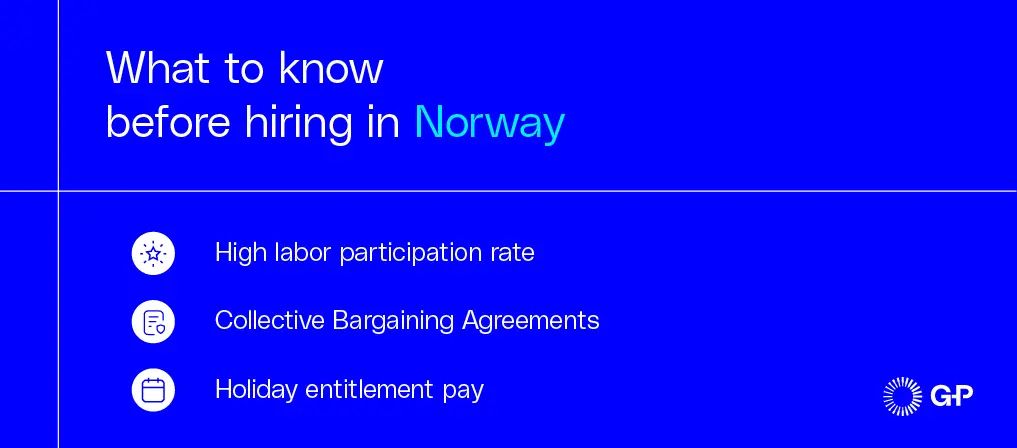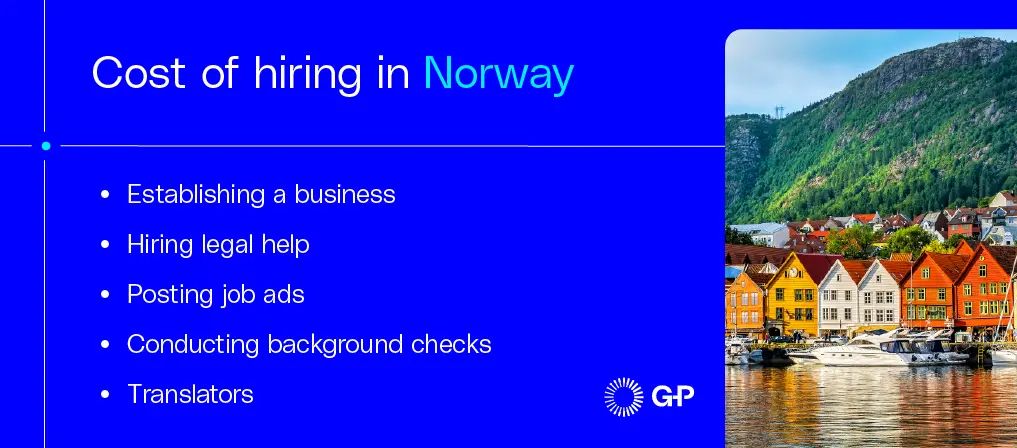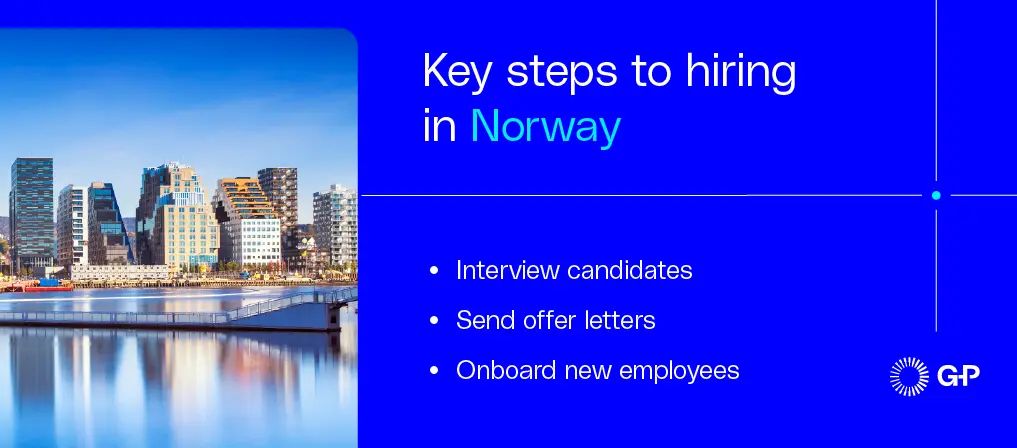Hiring employees in Norway gives you access to a skilled and well-educated workforce. You’ll have no problem finding qualified workers in sectors like shipping and maritime engineering, finance, IT, and biotechnology.
Our guide will tell you everything you need to know about hiring in Norway.
What to know before hiring in Norway

If you’re expanding your business into Norway for the first time, there are important legal requirements to be aware of. These norms and laws influence hiring practices in Norway and many aspects of the employer-employee relationship.
If you’re unsure where to begin, G-P Gia ™ , our AI-powered global HR agent, can answer your toughest compliance questions across 50 countries — including Norway — and all 50 U.S. states. Reduce your reliance on outside counsel and cut the time and cost of compliance by up to 95% with Gia.
Let’s take a look at six things to know about hiring in Norway.
1. The Norwegian labor market
Norway has a thriving economy and an impressive labor participation rate of 72%. As a point of reference, the U.S.’s labor participation rate is 62%. Norway employees also enjoy high levels of job satisfaction. A recent report revealed that 83% of employees in Norway were happy with their work conditions.
If you’re expanding to Norway, you’ll need a competitive benefits package to attract top talent. You can easily administer benefits plans with G-P EOR. Our in-house experts continuously monitor employment laws to meet country-specific regulations and norms. Build and manage benefits plans through our platform to provide a smooth employee experience in Norway.
The country’s workforce is well educated, mainly due to Norway’s tuition-free public universities. Norway has the third most educated population in Europe — 45% of the population has a tertiary education.
2. Common languages
Norway has two official languages: Norwegian and Sami. Sami is an indigenous language mostly spoken in certain regions of northern Norway. Norwegian is more common. You may encounter two written forms of Norwegian: Bokmål, the more common form that’s based on written Danish, and Nynorsk, which is mainly based on regional dialects in western Norway.
Norway also has high English proficiency rates. Almost 90% of the population speaks English at a basic level.
3. Employment regulation
The Working Environment Act (WEA) and the Holidays Act dictate national employment laws in Norway. Collective agreements are also common sources of employment regulation. Two of the most significant collective organizations in Norway are the Confederation of Norwegian Enterprise and the Norwegian Confederation of Trade Unions.
Employers are required to create written employment contracts for employees within their first month of employment.
The termination process in Norway is one of the most complex in Europe. Employee protections are strong, even during the probation period. G-P EOR has an Employment Contact Generator to help you draft compliant employment contracts that meet all legal requirements and best practices in Norway.
4. Working hours and minimum wage
The WEA limits workdays to nine hours within any 24-hour period. The average workweek in Norway is 34.22 hours. Employees are also entitled to a lunch break if they work more than 5.5 hours in one day. Employees can work more than 40 hours a week. Overtime must be compensated with a minimum pay supplement of 40% above the normal hourly wage.
There’s no national minimum wage in Norway. However, specific sectors have introduced minimum wages due to collective agreements. Norway’s national currency is the Norwegian Kroner (NOK). Use this currency to specify employees’ salary in their employment contract.
5. Taxes on income
Employers are responsible for deducting income tax from employees’ paychecks. Norway uses a progressive tax system. The system is divided into a base tax and a step or bracket tax. The base tax rate is currently 22% and applies to all employees, regardless of their income level. The step or bracket tax applies higher tax percentages to portions of income that fall into higher tax brackets.
Employees and employers also make social security contributions. Employers’ contribution rates are significantly higher. These contributions, along with taxes, fund Norway’s National Insurance Scheme. This provides Norwegians with benefits for retirement, disability, unemployment, sick leave, and more. Employers must also provide employees with a supplementary pension scheme known as the Mandatory Occupational Pension Scheme (OTP).
6. Vacation entitlement
In addition to public holidays, full-time employees get a minimum of 25 workdays off each year. Employees aged 60 or older receive an additional week, bringing their total to 31 days. Employees under a CBA also typically get 30 days.
Vacation time is paid, but Norway’s system for holiday pay is notoriously complex. Unlike most countries, vacation pay is calculated and paid separately at a specified time of the year. This is often in June or before employees take their vacation. The rate for a standard 25-day vacation is 10.2% of the previous year's earnings. If the employee is entitled to a five-week vacation, the rate increases to 12%.
In Norway, employees get sickness benefits for up to 52 weeks during three years. If an employee takes sick leave, returns to work, and then becomes ill again, the separate sick periods will be added up and combined if the gap between them is less than 26 weeks. Once the 52-week limit is reached, employees must wait 26 weeks before receiving benefits again.
Employers and the Norwegian Labor and Welfare Administration (NAV) both pay for sick leave. The employer pays for the first 16 calendar days. After this, the NAV pays sickness benefits directly to the employee.
Top hiring hubs in Norway
Some Norwegian cities are known for particular industries. Knowing what each city has to offer can help you channel your hiring efforts to the right place and fill roles faster.
The top talent hubs in Norway are:
-
Oslo is the capital of Norway and the country's main economic center. It’s home to many banks, insurance companies, and investment firms. You can find skilled workers in financial services, accounting, insurance brokering, and fintech.
-
Bergen plays a key role in marine education and research. The University of Bergen, Norway's largest marine studies institute, is located here. The city has a large talent pool in marine science, ocean exploration, and aquaculture.
-
Stavanger is Norway's energy capital. Many companies working off Norway’s North Sea coastline, including the national energy company Equinor, have offices here. As the energy sector evolves, Stavanger is also emerging as a hub for digitalization and renewable energy projects.
-
Trondheim is often referred to as Norway’s tech and knowledge capital. Home to the Norwegian University of Science and Technology (NTNU), the city leads in engineering, IT, and innovation.
-
Tromso is the largest city in northern Norway. It’s a center for Arctic-related research and education, especially in areas like fisheries and environmental sciences. Tromso also has a growing startup scene, encouraged by incubators and co-working spaces.
Key industries in Norway
Understanding Norway’s main industries helps you benchmark salaries and benefits. You can use this insight to make smart choices about where to invest and grow your workforce. The main industries in Norway include:
-
Oil and gas: The country has strong skills in exploration, extraction, processing, and technology related to these sectors. Norway is also investing heavily in offshore wind, hydrogen, and carbon capture and storage (CCS). Specialist talent includes petroleum engineers, geologists, and technicians for offshore operations and maintenance.
-
Maritime: Norway's extensive coastline and seafaring tradition support a maritime industry that includes shipping, shipbuilding, marine equipment, and ocean technology. Specialist talent includes naval architects, shipping and logistics professionals, and marine biologists.
-
Technology and digitalization: Norway's tech industry is thriving, particularly in Oslo and Trondheim. The country's large energy and maritime sectors are seeking ways to modernize and innovate through digitization. Specialist talent includes software engineers, developers, cloud architects, and cybersecurity experts.
-
Finance: Norway has a stable and well-regulated financial sector. Digital tools and fintech solutions are in high demand. Specialist talent includes financial analysts, investment professionals, and fintech developers.
-
Advanced manufacturing: Norway excels in specialized, high-tech manufacturing, particularly maritime equipment and oil and gas components. Specialist talent includes various engineering fields.
The cost of hiring an employee in Norway

Whether you’re hiring one employee or an entire team in Norway, expenses are inevitable. Budget for the following:
-
Research: Determine where in Norway you want to establish your business, and research the legalities that relate to employment practices there, as well as any requirements for your industry.
-
Entity setup: Unless you work with an Employer of Record (EOR), you’ll have to set up a branch or subsidiary in Norway and cover the related costs.
-
Travel: If you have to travel to Norway to recruit or set up your new office, you should factor in these costs.
-
Job advertisements: Advertising your job online or in print can add to your recruitment expenses.
-
Translator: If you’re evaluating applications and interviewing candidates who speak Norwegian, and this isn’t your first language, consider hiring a translator. A translator can help with in-person and virtual communication, but it adds to your hiring costs.
According to G-P Verified Sources from Gia, the total annual employer burden rate in Norway, which includes costs triggered on top of salaries, is around 25%.
What does a company need to hire employees in Norway?
Make sure you cover these essentials before expanding your team in Norway:
-
Open a bank account, deposit the required capital, and get approval from an auditor.
-
Register with the Central Coordinating Register for Legal Entities and obtain an organization number.
-
Register your company name with the Register of Business Enterprises.
-
Register with the national VAT register.
-
Enroll in mandatory workers’ injury insurance.
-
Arrange a pension scheme for employees.
After you’ve completed these steps and your company is formally recognized in Norway, you can begin hiring. This process and the research that goes into understanding employment, tax, and business laws are a major investment of time and money.
Use G-P EOR to hire full-time employees in Norway without setting up your own entity. Build your team in Norway at a lower cost and with peace of mind that you’re doing so compliantly.
Steps to hiring in Norway

There are five basic steps for hiring in Norway. We’ve summarized these steps below, along with tips based on local customs and requirements that govern hiring practices in Norway.
1. Notify the NAV of vacancies and post job ads
Notify the Labor and Welfare Administration (NAV) of your company’s vacant positions. You have to notify existing employees as well (if you have them). Then, create a job ad in either Norwegian, English, or both, and post it on popular job boards.
Professionals in Norway mostly look for jobs online. Some of the most popular job sites in Norway are Arbeidsplassen, EURES, Gule Sider, and FINN. LinkedIn is also popular in the country, especially among certain age groups.














